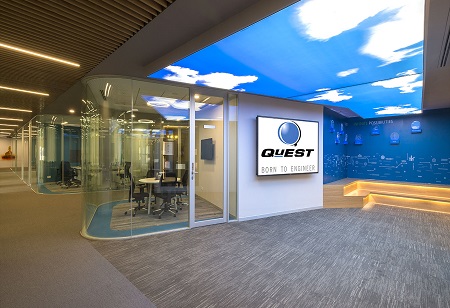
Quest Global Attains US Chip Design Firm Synapse

 Quest Global an product engineering services company has acquired US-based Synapse Design, a chip design and engineering services provider. The deal value was not disclosed. Synapse counts AMD, Microsoft and Qualcomm among its customers, and employs over 700 people in the US, Europe and India. It had $36 million in revenue in the 2020-21 financial year.
Quest Global an product engineering services company has acquired US-based Synapse Design, a chip design and engineering services provider. The deal value was not disclosed. Synapse counts AMD, Microsoft and Qualcomm among its customers, and employs over 700 people in the US, Europe and India. It had $36 million in revenue in the 2020-21 financial year.
It was founded in 2003 by Satish Bagalkotkar and Devesh Gautam, Synapse Design is a specialist in building system-on-chip (SoC) and has built a sizable talent pool in analog/mixed-signal & software design. Synapse will operate as a subsidiary of Quest Global under the leadership of Bagalkotkar and Gautam.
Quest Global is spread across 13 countries, with 55 global delivery centres and over 11,450 employees. Ajit Prabhu , chairman and CEO of Quest Global, expressed, “We are focusing on chip design to core product development and taking the application to the people -- from chip to cloud to the crowd -- and Synapse helps fill the gap in chip design. Synapse will enable us to provide comprehensive design services, consulting, and software development services to our semiconductor customers.” Synapse is Quest’s 14th acquisition since it was founded two decades ago. Synapse expects to add at least 2,000 engineers in the next four years at the intersection of electronics, software, and digital engineering services.
Bagalkotkar said the acquisition will combine Synapse's capabilities in providing design and consulting services with Quest’s capabilities in providing embedded and software services, and expertise in the convergence of electronics, software, and digital engineering. “This combination will help us to deliver world-class engineering services and solutions to customers across various industries.”
Prabhu said there’s a surge in demand for engineering talent and Quest has more than 2,000 open positions, 300 of which are in the semiconductor segment. He said the aerospace and connected/autonomous programmes are seeing significant growth momentum, and these would generate demand for chips.
“Clients are interested in every car getting connected. If cars are autonomous, all systems have to work together, and then connect with remaining cars on the roads. All this requires hundreds of chips, every system has to have a chip to compute and connect to a central computer that operates the car, chips are the nuts and bolts of the future,” he said.